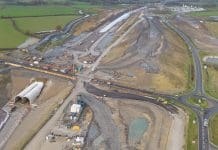New micro robots will be built to repair the UK’s vast underground pipe network and prevent disruption of roadworks in the future
Scientists from universities of Sheffield, Leeds, Birmingham and Bristol will use £7m government investment to develop 1 cm-long robotic devices that use sensors and navigation systems to find and mend cracks in pipes. The traffic closures and disruption to businesses of these roadworks is estimated to amount to more than £5bn.
A further 14 projects supported by £19.6m government investment, through the Industrial Strategy Challenge Fund (ISCF), will see robots sent to hazardous workplaces such as offshore wind-farms and nuclear-decommissioning facilities. Researchers will test new technologies, such as the use of artificial intelligence (AI) software on satellites in orbit to detect when repairs are needed, and drones for oil pipeline monitoring.
Science Minister Chris Skidmore said: “While for now we can only dream of a world without roadworks disrupting our lives, these pipe-repairing robots herald the start of technology that could make that dream a reality in the future
“From deploying robots in our pipe network so cutting down traffic delays, to using robots in workplaces to keep people safer, this new technology could change the world we live in for the better. Experts in our top UK universities across the country are well-equipped to develop this innovative new technology.
“We have put research and development at the heart of our modern Industrial Strategy, with the biggest boost to funding in UK history to create high skill jobs and boost productivity across the country.”
UK Research and Innovation (UKRI) Chief Executive, Professor Sir Mark Walport said: “The projects announced today demonstrate how robots and artificial intelligence will revolutionise the way we carry out complex and dangerous tasks, from maintaining offshore wind farms to decommissioning nuclear power facilities.
“They also illustrate the leading role that the UK’s innovators are playing in developing these new technologies which will improve safety and boost productivity and efficiency.”
The £26.6m government funding boost is part of the modern Industrial Strategy, investing in the technologies of tomorrow and creating high skilled jobs across the country. The UK already develops world-leading robotics technologies, and these projects delivered by UKRI will help make this a sector for UK businesses to grow and dominate international markets.
Health and Safety Executive (HSE) Chair Martin Temple added: “The key purpose of the Health and Safety Executive is to save lives and prevent workplace injury and ill health. To achieve this, we need businesses to work with us and to be innovative in their thinking around managing risk in the workplace. New and emerging technologies are shaping our working environment.
“As a regulator we want to encourage industry to think about how technologies such as robotics and AI can be used to manage risk in the workplace, safeguarding workers both now and in the future world of work.”














Which four universities please?
Hi Annette,
The universities are Sheffield, Leeds, Birmingham and Bristol. Hope this has helped!
Thanks
Steph